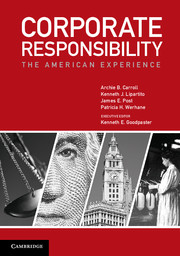Book contents
- Frontmatter
- Contents
- About the Authors
- Foreword
- Preface
- Introduction The Corporation in the Public Square
- Part I The Seeds of Corporate Responsibility
- Part II Corporate Responsibility Comes of Age
- Chapter 6 Corporate Legitimacy Affirmed (1945–1963)
- Chapter 7 A Revolution of Rising Expectations (1963–1973)
- Chapter 8 Managing Corporate Responsibility (1973–1981)
- Part III Taking Account of Corporate Responsibility
- Endnotes
- References
- List of Plates
- Index
- Plate section
Chapter 6 - Corporate Legitimacy Affirmed (1945–1963)
Published online by Cambridge University Press: 05 November 2012
- Frontmatter
- Contents
- About the Authors
- Foreword
- Preface
- Introduction The Corporation in the Public Square
- Part I The Seeds of Corporate Responsibility
- Part II Corporate Responsibility Comes of Age
- Chapter 6 Corporate Legitimacy Affirmed (1945–1963)
- Chapter 7 A Revolution of Rising Expectations (1963–1973)
- Chapter 8 Managing Corporate Responsibility (1973–1981)
- Part III Taking Account of Corporate Responsibility
- Endnotes
- References
- List of Plates
- Index
- Plate section
Summary
The winning alliance between business, labor, and the US government during World War II paved the way for an expanded role for business in the postwar period and throughout the 1950s. Two important themes emerged during this period. The first was the belief that the “corporation problem” – that is, the problem of unchecked corporate power – had been worked out to a clear balance between power and responsibility. Corporations embraced their new expanded social role, as indicated by an accommodation with labor, emphasis on service to the consumer, efforts in philanthropy, and their social conscience on issues of race and equality, and the ethical and even religious values that seemed to infuse management. As responsible members of society, corporations also took a vital role in world affairs, supporting American military might, and spreading the good word of capitalism against the communist alternative.
Business in this period operated in a pluralistic mode, which is the second theme of this chapter. In comparison with earlier eras stressing paternalism (late nineteenth century), stewardship (early twentieth century), or corporatism (1920s), the pluralistic 1950s were characterized by businesses that responded to a variety of voices and operated in a balance of power among competing interests. As articulated by important thinkers such as John Kenneth Galbraith, Peter Drucker, and Adolf Berle, pluralism was seen to foster business's expanded social role and assure the industrial peace.
- Type
- Chapter
- Information
- Corporate ResponsibilityThe American Experience, pp. 195 - 229Publisher: Cambridge University PressPrint publication year: 2012



